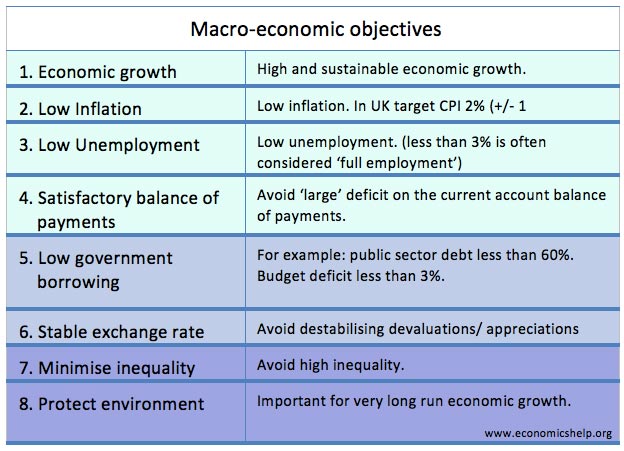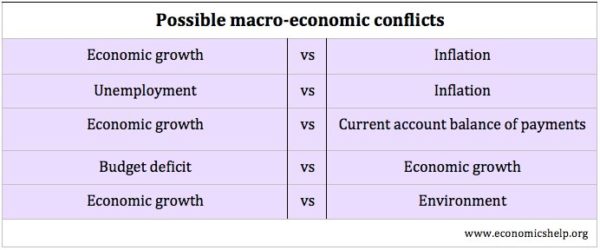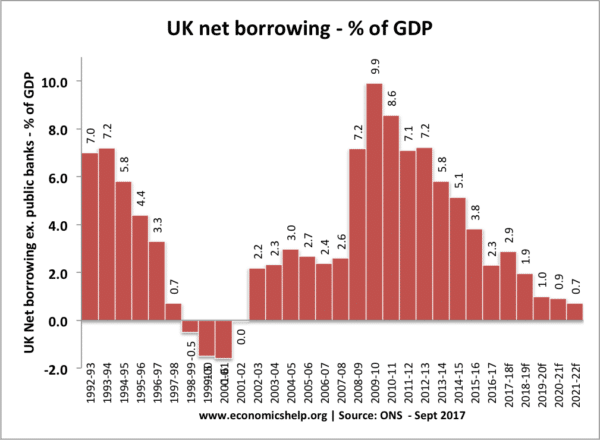One of the first lessons in economics is the idea of opportunity cost. If you pursue one choice, it means you can’t do another option. The government faces countless decisions based on this. For example, the government could spend more on health care, but the opportunity cost would be lower spending on education. We could cut the 50p income tax on high earners, but, this would require a slightly higher rate of VAT.
Examples of different government economic priorities
- Reducing inequality vs maximising incentives and economic growth
- Reducing budget deficit vs maintaining public spending
- Economic growth vs environment
- Reducing unemployment may conflict with inflation.
- Tax cuts for the wealthy may require welfare cuts which affect the poorest.
- Cutting back on public sector investment can reduce budget deficit, but in long-term may lead to lower productivity growth.
The government also faces a decision on which is the most important macro-economic objective. For example, pursuing one objective – low inflation may conflict with other objectives, e.g. to target low inflation may lead to lower economic growth.
These different objectives can have different trade-offs
Reducing unemployment may cause inflation. Stimulating the economy with the expansionary fiscal policy can achieve a higher rate of economic growth and lower unemployment (at least in the short-term) but it could lead to higher inflation and current account deficit.
Maximising economic growth may have a conflict with protecting the environment. Higher growth may lead to more rapid use of resources, higher pollution and greater carbon emissions. Similarly, if the government pursues a green agenda – cutting carbon emissions may have a conflict of requires higher taxes and a lower rate of growth.
- Through worth pointing out some economists feel a transition to a green, carbon-free economy doesn’t have to be at the cost of lower growth.
See more: conflicts between macroeconomic objectives
Economic growth vs Deficit Reduction
A big issue for many governments is the decision between prioritising economic growth and prioritising reducing the budget deficit. To a large extent, the coalition government elected in 2010 sought to reduce the UK’s budget deficit as the governments main objective.
They saw the deficit as unsustainable and so pursued a policy of tax increases and spending cuts to reduce the budget deficit.

However, the problem is that since introducing this stance and policy, the economy has started to slide into a double dip recession. Spending cuts have caused unemployment; also the talk of austerity has reduced consumer/business confidence. Many now expect a double dip recession. Therefore, the pursuit of deficit reduction has conflicted with the other priority of economic growth and reducing unemployment.
Unfortunately, a slowdown in economic growth and persistently high unemployment also leads to lower tax revenues and more automatic fiscal stabilisers (e.g. unemployment benefit spending). Therefore, the reduction in the deficit is minimised.
The government claims it was necessary to reduce the budget deficit – they had no option. If they hadn’t, the UK may have experienced a bond crisis like in other EU countries.
However, others argue this is not the case. Because the UK is not in the Euro and has an independent monetary policy, there is much less scope for a liquidity crisis so markets are willing to lend the government money at low-interest rates. (why UK bond yields stayed lower)
If the market is willing to lend at low-interest rates, it would make more sense for the UK to target high growth; this high economic growth would provide a better platform for introducing a long term plan to reduce the structural deficit. In the short term, the government could priorities public spending which offers a good rate of return (e.g. spending on roads, rail and housing). This provides both a boost in demand and helps long term productivity. In other words, priorities should be:
- Economic growth / low unemployment.
- Reduce the deficit.
What do you think should be the priorities of the government?
Related
- Pursuing the wrong objective – how the government targeted low deficit at expense of economic growth



